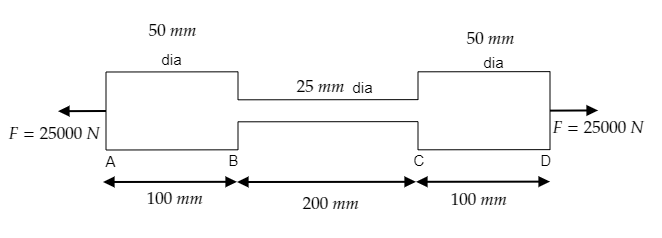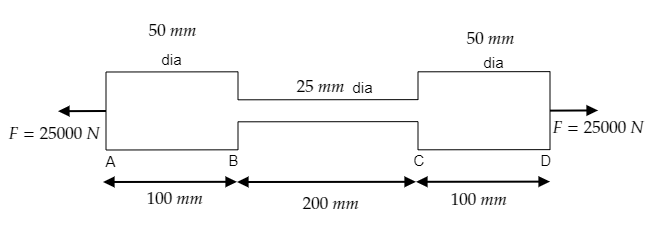Question
Question: A steel bar ABCD \(40{\text{cm}}\) long is made up of three parts AB, BC, and CD as shown in the fig...
A steel bar ABCD 40cm long is made up of three parts AB, BC, and CD as shown in the figure. The rod is subjected to a pull of 25kN. Find the extension of the rod. (Young’s modulus for steel is 2×1011Nm−2 ).
(dia means diameter in diagram)

A) 0.0637mm
B) 0.0647mm
C) 0.0657mm
D) 00667mm
Solution
The force applied for the extension of the rod will be experienced equally by all the three sections of the rod. The extension of the rod will be the sum of the extension of the three sections of the rod. So determining the stress of each part will help us to determine the change in length of the rod as the stress and strain are related by Young’s modulus of the material of the rod.
Formulas used:
i) The stress developed in a body is given by, σ=AF where F is the force exerted on the body and A is the area of the body.
ii) The longitudinal strain in a body is given by, ε=lΔl where Δl is the change in length and l is the original length of the body.
iii) Young’s modulus of a material is given by, Y=εσ where σ is the stress and ε is the strain in the body.
Complete step by step answer:
Step 1: Sketch the given figure and list the parameters given.

From the figure, we have the following parameters of the rod.
The length of part AB is lAB=100mmand its diameter is dAB=50mm or its radius is rAB=25mm=0.025m. Then its area will be AAB=πrAB2=π(0.025)2m2 .
The length of part BC is lBC=200mm and its diameter is dBC=25mm or its radius is rBC=12.5mm=0.0125m. Then its area will be ABC=πrBC2=π(0.0125)2m2 .
The length of part CD is lCD=100mm and its diameter is dCD=50mm or its radius is rCD=25mm=0.025m. Then its area will be ACD=πrCD2=π(0.025)2m2 .
The force applied to each part is the same.
i.e., FAB=FBC=FCD=25000N
Young’s modulus for steel is given to be Y=2×1011Nm−2.
Step 2: Express the stress of each part.
The stress developed in a body is generally expressed as σ=AF where F is the force exerted on the body and A is the area of the body.
Then for part AB, the stress will be σAB=AABFAB ------- (1)
Substituting for FAB=25000N and AAB=π(0.025)2m2 in equation (1) we get the stress of part AB as σAB=π(0.025)225000=1.273×107Nm−1
Similarly, for part BC we have, σBC=ABCFBC ------- (2)
Substituting for FBC=25000N and ABC=π(0.0125)2m2 in equation (2) we get the stress of part BC as σBC=π(0.0125)225000=5.092×107Nm−1
And for part CD we have, σCD=ACDFCD ------- (3)
Substituting for FCD=25000N and ACD=π(0.025)2m2 in equation (3) we get the stress of part CD asσCD=π(0.025)225000=1.273×107Nm−1
Step 3: Express the change in length of each part to determine the extension of the rod.
The longitudinal strain in a body is given by, ε=lΔl where Δl is the change in length and l is the original length of the body.
Also, Young’s modulus of a material is given by, Y=εσ where σ is the stress and ε is the strain in the body.
Combining these two relations we have, Y=Δlσl
⇒Δl=Yσl
For part AB we have, ΔlAB=YσABlAB -------- (4)
On substituting for σAB=1.273×107Nm−1, lAB=0.1m and Y=2×1011Nm−2 in equation (4) we get the change in length of part AB as ΔlAB=2×10111.273×107×0.1=6.365×10−6m
Since the stress and the length of parts AB and CD are the same, we have ΔlCD=6.365×10−6m .
And for part BC we have, ΔlBC=YσBClBC -------- (5)
On substituting for σBC=5.092×107Nm−1, lBC=0.2m and Y=2×1011Nm−2 in equation (5) we get the change in length of part BC as ΔlBC=2×10115.092×107×0.2=5.092×10−5m
Now the extension of the rod is Δl=ΔlAB+ΔlBC+ΔlCD --------- (6)
Substituting for ΔlAB=ΔlCD=6.365×10−6m and ΔlBC=5.092×10−5m in equation (6) we get, Δl=(6.365×10−6)+(5.092×10−5)+(6.365×10−6)=6.37×10−5m
∴ the change in length of the rod is Δl=0.0637mm.
So the correct option is (A).
Note: While substituting the values of physical quantities in any equation, make sure that all the quantities are expressed in their respective S.I. units. If this is not the case, then the necessary conversion of units must be done. Here the length and diameter (or radius) of the three sections of the rod were not expressed in millimetres so we converted these to meters before substituting in their values in the different equations.
